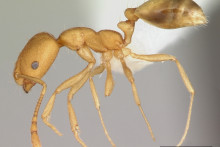The pharaoh ant, or Monomorium pharaonis, is hard to see with the human eye and cannot be eradicated easily, says Annette Weenink of De Veste (part of Vechtdal Wonen). ‘This has been going on for several months now. We don't know exactly where the animal comes from. Perhaps a queen ant has been brought in the suitcase of an international student, because the ant originates from tropical places. I have also seen the ant when I was on vacation in Indonesia.’
In the Netherlands, the insect only lives indoors, Weenink explains. ‘The animal loves warm spaces and they find them in our apartment complexes. At our office, located on the ground floor of Sky, there are occasionally also a couple at the toilet. The little ant really gets through everything: from water pipes to sockets.’
De Veste has hired a professional pest control expert. ‘It started with combatting pests in one or two student rooms, but since last month we have begun a large-scale extermination. Pest control agency Rentokil inspects every home in the Sky, Box and a few homes at the Witbreuksweg, to place poison in the ants walk routes where necessary. Two weeks later they check the house again.’

(Photo: the ants looking for food, in on of the student houses in the Box)
Fight
The fight against the ant is probably a process for the long haul, Weenink says. ‘It may take one or two years before the pharaoh ant will be completely eradicated. Unlike the "normal" black ant, the pharaoh ant has multiple queens. That makes combating them difficult. Moreover, it must come from two sides: we take them on, but the students also have to help. The behavior of the resident must also change, otherwise the ants will return.’
De Veste therefore distributed information forms within the apartment complexes. Keep the house as clean as possible, do not leave food waste behind, do not go fight the ants yourself and warn De Veste if you suffer from the ant plague, as can be read in the flyers. Every possibly contaminated campus home has been given a time slot for eradication. The Box has just finished fighting, now it is Sky's turn in the coming weeks.
The brochure also states that the pharaoh ants ‘can eat from open wounds and thereby transmit diseases.’ Nevertheless, Weenink emphasizes that the insects are mainly annoying, not necessarily dangerous. ‘Naturally, residents should pay attention with open wounds. But the ants are primarily annoying. We don't want to create panic. There’s no need for that. De Veste does everything to combat the plague. Now it's a matter of checking and keep on checking.’
Unwanted roommate
‘A maximum of two millimeters long and red-yellow in color’, that's how UT student Lentin Steeman describes the ants. He studies Electrical Engineering and until recently had the tiny ant as an unwanted roommate in his student residence, an apartment in the Box. ‘From the first day that I moved into my home, in August 2018, I came across the ants.’
The inconvenience was limited during the first months, says Steeman. ‘Occasionally I saw one, but it didn't really bother me. It was only when I left food that many ants appeared. At first I thought: maybe they will leave on their own. Unfortunately, that turned out not to be the case.’ After the summer vacation Steeman decides to alert housing corporation De Veste. ‘They were with my neighbour to close holes in his walls to prevent the ant plague. Then I asked De Veste if they also wanted to treat my house. They responded that they would handle the entire building in a short time.’
A visit from the pest fighter quickly followed. ‘They visited at the end of October and again at the beginning of November to check. They left a kind of sugary jelly with poison on the walking route of the ants. I have seen one or two ants since then, but the plague seems to have disappeared. I remained pretty relaxed. But it is of course not really pleasant, when you are sitting on the couch and suddenly an ant runs across your laptop screen.’







